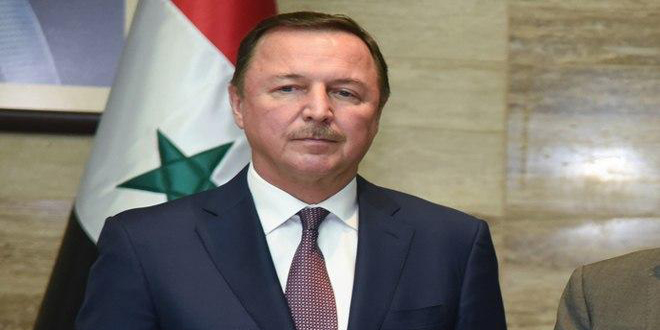The Russian ambassador to the Assad regime, Alexander Yefimov, highlighted the significant differences between the positions of the regime and Turkey regarding the normalization of their relations. He emphasized that restoring what has been destroyed over the span of 12 years cannot be accomplished in just a few months.
Yefimov stated in an interview with the pro-national newspaper “Al-Watan” on Monday that recovering from the extensive damage incurred over 12 years requires substantial effort and time. He candidly acknowledged that the two sides still have a long way to go in bridging their differences.
Syria’s Ambassador to UN Criticizes IAEA Talks on Nuclear Safeguards
The meetings of the Syrian-Turkish-Russian-Iranian Quartet, however, have yielded positive outcomes, according to Yefimov.
Furthermore, he considered the resumption of direct public contact between Syria (Assad’s militia government) and Turkey, after more than a decade of frozen bilateral relations, to be a significant achievement in itself.
Regarding the agreed-upon road map between the two countries, Yefimov mentioned that it is currently being drafted, and the initial discussion of its contents is scheduled to occur soon.
Yefimov revealed that over the past six months in Moscow, there have been organized interactions between Syrian and Turkish representatives, involving army officers, intelligence services, and foreign ministry officials. The participation of Iran alongside Russia and Turkey, the three guarantor countries of the Astana process, underscores the success of this process.
The Russian ambassador also addressed the progress made in normalizing relations between the regime and Arab countries. He considered the current stage to be more than satisfactory, as most countries in the region have decided to reestablish constructive contacts with Syria.
Normalization between Turkey and the regime
In May, Mevlut Cavusoglu, former Turkish Foreign Minister, unveiled a political roadmap aimed at strengthening relations with the Assad regime. He outlined three key objectives while acknowledging three factors that impede the return of Syrian refugees to their country.
During a press conference in Antalya, Cavusoglu emphasized the shared goals of the countries participating in the quadrilateral meeting in Moscow. These goals include eliminating terrorist threats, facilitating the safe return of refugees, and revitalizing the political process in Syria.
Cavusoglu highlighted Turkey’s sincere efforts to normalize relations with the Assad regime. He emphasized that these interconnected goals require comprehensive plans and policies that extend beyond daily political slogans.
The Turkish minister underscored the necessity for resolute and consistent military and diplomatic engagement to achieve these objectives.
In the same month, the foreign ministers of Turkey, Russia, Iran, and the regime concluded a quadrilateral meeting hosted in Moscow as part of the ongoing process of normalizing relations between the Assad regime and Turkey.
During that time, Sergey Lavrov, the Russian Foreign Minister, stated that the roadmap should clearly define the positions of Syria and Turkey on their priority issues. These issues include restoring the Syrian government’s control over the entire territory of the country, ensuring reliable security along the shared 950-kilometre border with Turkey, and preventing cross-border attacks and terrorist infiltration.
This article was translated and edited by The Syrian Observer. The Syrian Observer has not verified the content of this story. Responsibility for the information and views set out in this article lies entirely with the author.


